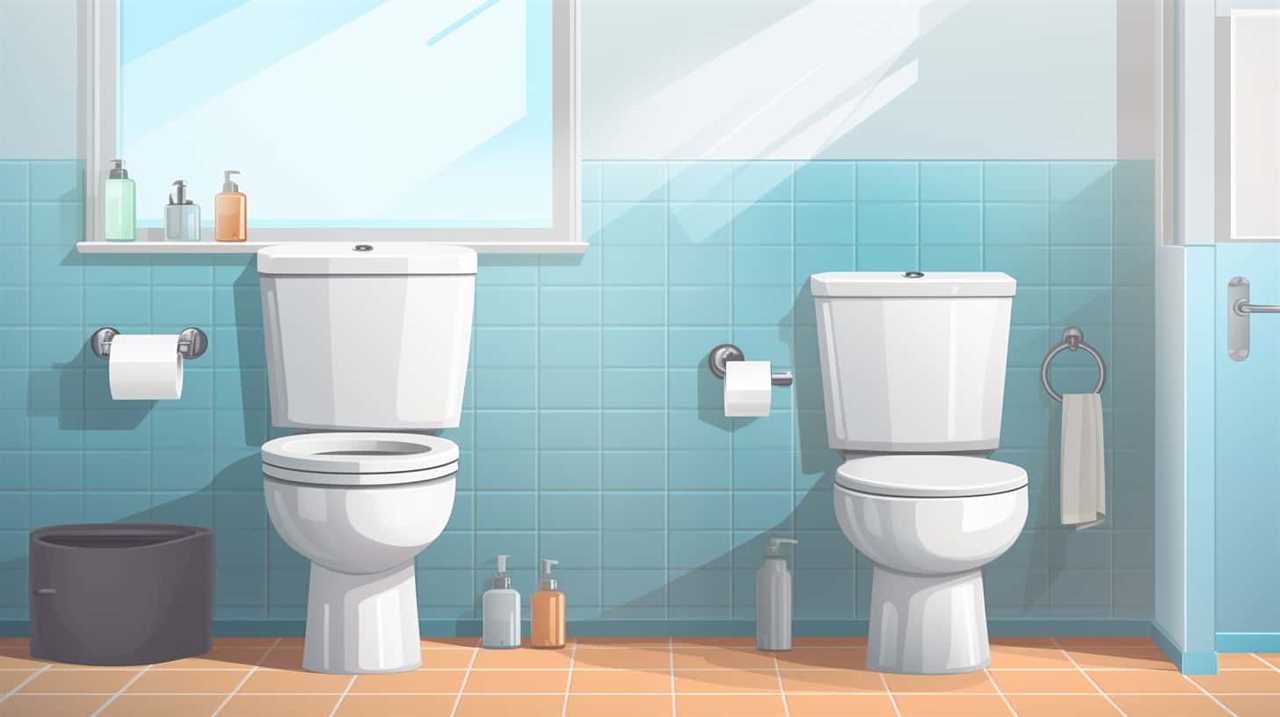Have you ever wondered why we can’t put toilet paper in the toilet in some countries? It may seem like a simple question, but the answer is far from straightforward.
In this article, we will delve into the reasons behind this seemingly peculiar practice. From plumbing infrastructure limitations to environmental concerns and cultural practices, we will explore the intricacies surrounding toilet paper disposal.
So, fasten your seatbelts as we embark on this informative journey to unravel the mysteries of toilet paper etiquette around the world.
Key Takeaways
- Some countries have limitations in their plumbing infrastructure, leading to issues with septic systems and aging infrastructure.
- Flushing toilet paper can lead to clogs and blockages in septic systems, causing costly repairs and maintenance.
- Flushing toilet paper can also cause water pollution and contamination of groundwater sources due to the chemicals used in its production.
- Cultural practices and beliefs influence toilet paper disposal in certain countries, with alternative methods such as bidets or dedicated bins being used instead.
Plumbing Infrastructure Limitations
In some countries, we can’t put toilet paper in the toilet due to limitations in the plumbing infrastructure. This is particularly common in areas with septic systems and aging infrastructure. Septic systems are designed to treat and dispose of wastewater on-site, making them a popular choice in rural areas. However, these systems often have limited capacity and can be easily overwhelmed by excessive toilet paper.

As a result, residents are advised to dispose of toilet paper in dedicated bins instead of flushing it down the toilet. Additionally, in countries with aging infrastructure, the pipes and sewage systems may not be able to handle the breakdown of toilet paper, leading to clogs and blockages. To prevent costly repairs and maintenance, it’s important to follow these guidelines and respect the limitations of the plumbing infrastructure.
Environmental Concerns
Considering the limitations in plumbing infrastructure, how do environmental concerns factor into the issue of not being able to put toilet paper in the toilet in some countries?
Environmental concerns play a significant role in this matter. Here are three reasons why toilet paper disposal can be problematic from an environmental perspective:
- Water pollution: When toilet paper is flushed down the toilet, it can end up in water bodies, causing pollution. The chemicals used in the production of toilet paper can contaminate rivers, lakes, and oceans, harming aquatic life and ecosystems.
- Septic tank issues: In areas where septic tanks are commonly used, excessive toilet paper can clog the system. This can lead to expensive repairs and maintenance, as well as potential contamination of groundwater sources.
- Sustainable alternatives: Some countries encourage the use of sustainable alternatives to toilet paper, such as bidets or reusable cloth wipes. These alternatives help reduce the environmental impact of toilet paper waste.
Considering the environmental implications of toilet paper disposal, it’s essential to understand how cultural practices and beliefs also influence this issue.

Cultural Practices and Beliefs
Cultural practices and beliefs greatly impact the disposal of toilet paper in certain countries. Taboo practices and hygiene customs play a significant role in determining how toilet paper is handled after use. To understand this further, let’s take a look at some examples:
| Country | Taboo Practices | Hygiene Customs |
|---|---|---|
| Japan | Avoid flushing paper | Use bidets or wet wipes |
| Greece | Avoid flushing paper | Dispose in a bin |
| China | Avoid flushing paper | Use water or bidets |
| India | Avoid flushing paper | Use water and a bucket |
| Mexico | Avoid flushing paper | Dispose in a bin |
In Japan, for instance, it is considered taboo to flush toilet paper due to their plumbing systems. Instead, bidets or wet wipes are commonly used for personal hygiene. Similarly, in Greece, China, India, and Mexico, toilet paper is not typically flushed, and alternative methods such as using water or disposing in a bin are preferred. These practices and beliefs stem from cultural norms and specific sanitation concerns, highlighting the diverse ways in which different societies approach toilet paper disposal.
Alternative Toilet Paper Disposal Methods
Our preferred alternative method for toilet paper disposal is to dispose of it in a designated bin. This is especially important in countries where septic systems or composting toilets are commonly used. By placing used toilet paper in a bin instead of flushing it down the toilet, we can help prevent clogs and damage to these systems. Additionally, disposing of toilet paper in a designated bin promotes hygiene and cleanliness in the bathroom.
- Use a lined bin: Make sure to have a bin with a liner to contain the used toilet paper and prevent any leaks or odors.
- Empty the bin regularly: To maintain sanitary conditions, it’s important to empty the bin regularly and dispose of the waste properly.
- Provide clear instructions: If you have guests or visitors, make sure to clearly communicate the alternative toilet paper disposal method to avoid any confusion.
Now that we’ve discussed alternative toilet paper disposal methods, let’s move on to some tips for travelers.

Tips for Travelers
When traveling to countries where flushing toilet paper isn’t recommended, we can take a few simple steps to ensure a seamless and hygienic bathroom experience. Familiarizing ourselves with the local customs and understanding the sanitation issues can go a long way in avoiding any embarrassing or unhygienic situations. Here are some tips to keep in mind:
- Use a bidet or a water spray: Many countries provide bidets or water sprays as an alternative to toilet paper. This allows for effective cleaning without clogging the plumbing system.
- Dispose of used toilet paper in a waste bin: If flushing toilet paper isn’t advised, it’s important to dispose of it properly. Use the waste bin provided in the bathroom to maintain cleanliness.
- Carry pocket-sized tissue packets: In case toilet paper isn’t readily available, carrying pocket-sized tissue packets can be a lifesaver. These can be easily carried in a bag or pocket for quick access.
Frequently Asked Questions
How Does the Plumbing Infrastructure Differ in Countries Where You Can’t Put Toilet Paper in the Toilet?
In countries where you can’t put toilet paper in the toilet, the plumbing infrastructure differs due to variations in sewage systems. This has a significant impact on sewage treatment plants and requires alternative disposal methods.
What Are Some Environmental Concerns Associated With Flushing Toilet Paper in Certain Countries?
Flushing toilet paper in certain countries can lead to environmental concerns. It can overload septic tanks and strain sanitation systems. Therefore, it is important to dispose of toilet paper properly to maintain a healthy and sustainable environment.
What Cultural Practices and Beliefs Contribute to the Prohibition of Flushing Toilet Paper in Some Countries?
Cultural practices and beliefs in certain countries contribute to the prohibition of flushing toilet paper. These practices may be rooted in the belief that toilet paper can clog pipes or that it is unhygienic.

Are There Alternative Methods for Disposing of Toilet Paper in Countries Where It Can’t Be Flushed?
There are alternative methods for disposing of toilet paper in countries where it can’t be flushed, such as using designated bins or burning it. These methods aim to minimize the environmental impact of waste management.
What Tips Can Be Provided to Travelers Visiting Countries Where Toilet Paper Can’t Be Put in the Toilet?
When traveling to countries where toilet paper can’t be flushed, it’s important to be aware of alternative methods of disposal. Understanding local hygiene practices and carrying small bags for used paper can help maintain cleanliness and respect cultural norms.
Conclusion
In conclusion, understanding why some countries don’t allow toilet paper in the toilet is crucial for travelers. It’s not just about plumbing limitations or environmental concerns, but also cultural practices and beliefs.
By being aware of these factors, we can better respect and adapt to local customs. Remember, when visiting these places, there are alternative toilet paper disposal methods available.

So, before you flush, always ask and follow the guidelines to ensure a smooth and respectful experience.









